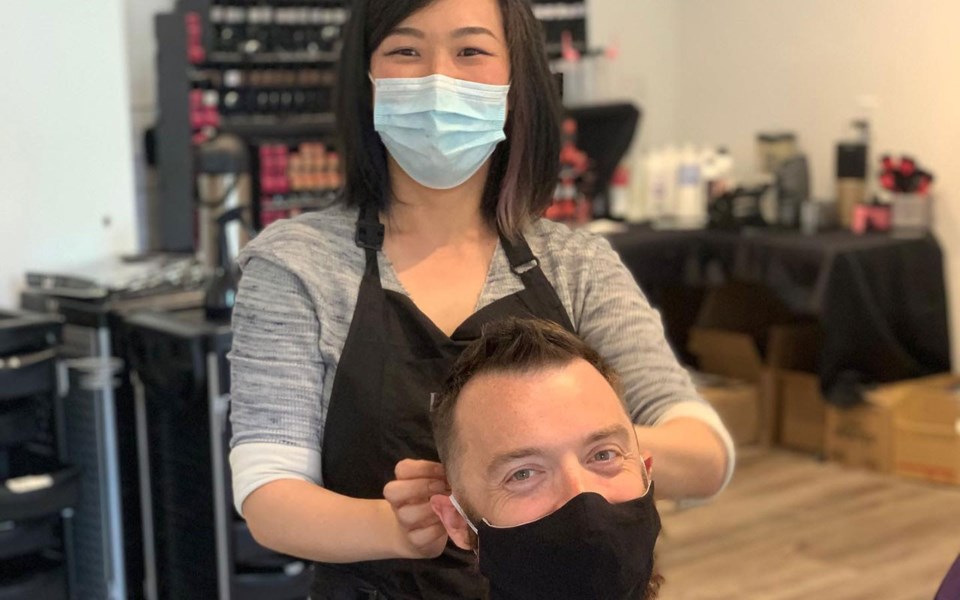When COVID-19 forced Sarah Williamson to temporarily close the hair salon she has run out of her Bayshores home since 2012, the news felt like a punch to the teeth. "I found myself on the floor and I didn't quite know what happened, because never in the history of hair in my lifetime has there been anything that prevented me from creating income from my career choice," said Williamson, the owner-operator of Love is in the Hair.
But emboldened by the financial assistance offered through the Canada Emergency Response Benefit, she quickly got to work. Having closely followed the reopening protocols for hair salons in other parts of the world, Williamson decided she would elevate the already high standards at her home studio, installing new cabinets and lighting, eliminating any high-contact touch-points, and cleaning more frequently.
"So now you're looking at a space that is starting to more closely resemble a surgery theatre," she laughed, adding that she hopes to set the safety standard for the local sector as a home-based salon that sees fewer people through its doors than a brick-and-mortar shop. "That's the path I chose to go down and I understand that I'll be one of few people doing this."
For other Whistler salons, the pandemic has reinforced the sanitary measures that were already in place—albeit with more frequency.
"Ultimately we're going above and beyond [the recommended] measures to ensure that things are done safely. But for the most part, things have been relatively similar because it's a practice we'd do anyways," explained Brandi Woodnutt, co-owner of Elevation Hair Studio, adding that new measures that are in place include clients being required to wear masks and fill out a health questionnaire before their appointment.
Elevation was also well positioned to manage the new safety guidelines, as ownership was already planning a complete renovation before the pandemic hit.
"We were luckily able to pivot and do that renovation, but if we had to close for three months again and had to pay rent for three months while we aren't bringing any money in, then that's a different story," Woodnutt said of a potential second wave of cases.
Blackcomb Barber Shoppe also took advantage of the shutdown to install new flooring—for the first time since 1994, said owner Amanda Stocks. "It only took 27 years and COVID to lay a new floor," she joked.
Stocks agreed that the new safety measures haven't been too difficult to manage given the previous sanitary standards of the industry—but physical distancing has inevitably impacted her bottom line.
"I went from five chairs to three, so I know I can never make the same money—even at Christmas," she noted, adding that the Nesters shop can accommodate up to seven people, including clients and stylists, at a time.
Jack Noesgaard, owner of The Loft Salon, joined the other two studios Pique spoke with in saying they weren't considering raising rates for the time being even with only three clients allowed in the space at a time and no longer allowing drop-ins.
"A lot of people have raised the rates in B.C. and across Canada. The way I look at it is in one way I can understand, because there are a lot of extra costs, but in another way, it's not our clients' fault that COVID hit," he said.
But Williamson believes is it "absolutely undeniable" that rates will have to go up if salons want to maintain the safety standards needed to avoid a second wave. "If I don't put my prices up, I will be out of business before the year is over," she said.
That's why Williamson has taken a novel approach to resuming her business. With plans to increase rates for new clients once her salon reopens at a reduced two days a week, she has launched a mobile service that sees her visit the homes of existing and past clients on her growing waitlist, allowing them to set their own prices. "I don't know what people's financial situation is and that's not any of my business to ask. But I want to serve my community, so as of now, my clients that had appointments cancelled [during the pandemic] will chose how much they pay for their hair," she said. Williamson also wants to be a resource for other salons as they settle into their new normal—and, somewhat rare for the competitive hair industry—plans to send clients she doesn't have the time to see to other shops in town.
"Sadly, because I'm going to be working half the hours I usually do, I'm not going to be able to service everyone that I used to. So my plan to support local salons is to be somewhat the Tinder of hair," she said. "So when my clients decide they can't stay with me anymore, I'm going to match-make them with a hair stylist in town. I'm going to look after them whether they're my client or not."




